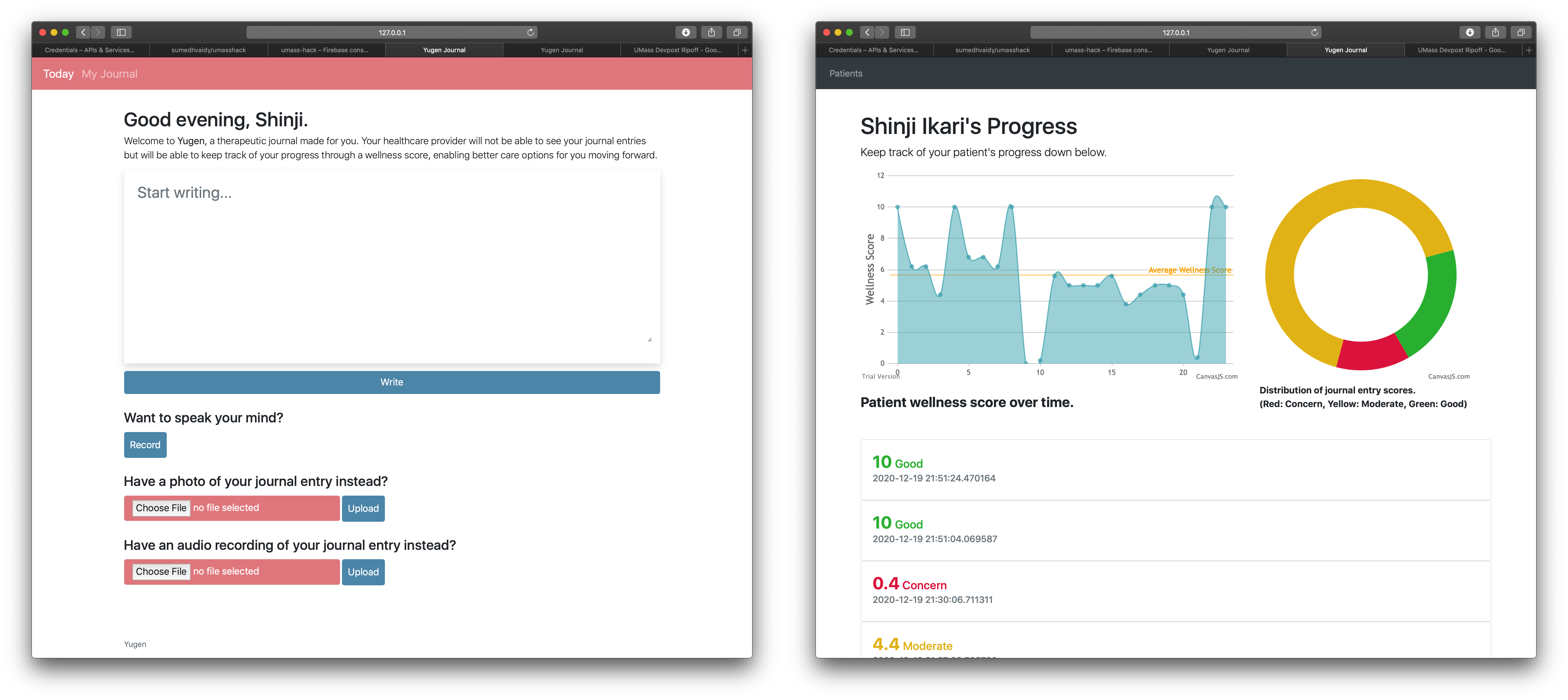Yugen Journal

Description as a Tweet:
Yugen is a therapeutic journal for patients with a focus on privacy. Patients can freely express their thoughts, while allowing healthcare practitioners to get an abstracted look at their progress.
Inspiration:
Yugen - the Japanese term meaning “deep introspectiveness”. When researching ways to cope with mental health issues, a solution that frequently came about was communicating one’s thoughts through a daily journal. We additionally found out that medical practitioners prescribe daily journals to patients suffering from mental disorders and illnesses as a way of learning about patients’ daily challenges and their moods. However, what we found was that medical practitioners had the responsibilities of getting a daily overview for all of their patient’s mental condition. Coupled with the fact that nearly 1 in 5 American adults will have a diagnosable mental health condition in any given year, medical practitioners will have to deal with numerous patients and read a lot of journals. Moreover as patients value privacy, more patients would feel less inclined to show some parts of their journal. Without compensating the privacy of our patients, our group wanted to give medical practitioners a score-based convenient and quicker way to pinpoint serious mental issues earlier and save lives in the form of Yugen.
What it does:
Yugen allows patients to journal down their thoughts, whether it be via text or the old fashioned way. We also support real-time voice recorded journal entries using the Google Speech Recognition API. After a patient has written down thoughts with their journal, they can submit it and view it in their ‘My Journal’ portal. Upon submission, Yugen uses a patient-wellness score generation based on Google Cloud’s Sentiment Analysis Natural Processing component and a mathematical formula to provide the score on a scale of 0-10. This score is then directed to a medical practitioners’ portal where real-time line and donut graphs depict patient “progress” through repeated journal entries. Practitioners also have the flexibility to view all of their patients’ progress under the “Your Patients” tab minimizing the hassle of searching for and keeping track of numerous patients throughout their busy work schedules.
How we built it:
Yugen was built using the Google Cloud API, specifically the Sentiment Analysis Cloud Natural Processing component. Our group generated a unique scaled score predicated on each sentiment data point that would be more representative of how the patient is feeling. The foundation was built using a Python backend coupled with a responsive JS frontend framework. Patient data was stored using a Python wrapper for Firebase (Pyrebase) and seamlessly allowed us to keep track of patients’ data and enhance the overall application testing process. Using Canvas.js, Patients’ data was succinctly displayed in the form of interactive area and donut graphs for better visualization. Our group was also able to integrate an OCR pipeline to process non-text based, image entries provided by patients. We were also able to allow users to submit live recorded journal entries making use of the Google Speech Recognition API.
Technologies we used:
- HTML/CSS
- Javascript
- Python
- Flask
- AI/Machine Learning
- Misc
Challenges we ran into:
While building Yugen, our group faced challenges while properly processing and updating our patient-wellness score using the Google Cloud sentiment analysis. In addition, displaying a patient’s information using concise graphical representations was something our group grappled with.
Accomplishments we're proud of:
We are proud of developing a web application tackling the issue of mental health within 36 hours. In the process, we enjoyed learning about OCR pipeline and effectively using Pytesseract and Pillow to process images and pdfs alike. We also had an enjoyable time implementing basic speech recognition to allow users to have an easier journaling process overall. Creating a user-friendly interface and aesthetically-pleasing graphs to better depict patient progress was also something we were proud of.
What we've learned:
Our group learned how to construct effective data visualizations using patient data, coupled with Flask. We also gained valuable experience working with the Google Speech Recognition and NLP APIs.
What's next:
A feature to implement next for Yugen is to allow a request journal button for a medical practitioner where if they feel that the metrics for a journal entry is concerning, they could request to read the patients’ journal entry.
Built with:
Our project was built with Bootstrap, Canvas.js, Firebase, Flask, Google-Cloud, Javascript, NLP, Pytesseract, Python, Google Cloud NLP and Google Cloud Speech Recognition APIs.
Prizes we're going for:
- Best Documentation
- Best Venture Pitch
- Best Web Hack
- Best Machine Learning Hack
- Best Healthcare Hack
- Best Use of Google Cloud
Team Members
Sid Rajaram
Kunal Bhargava
Shouri Addepally
Sumedh Vaidyanathan
